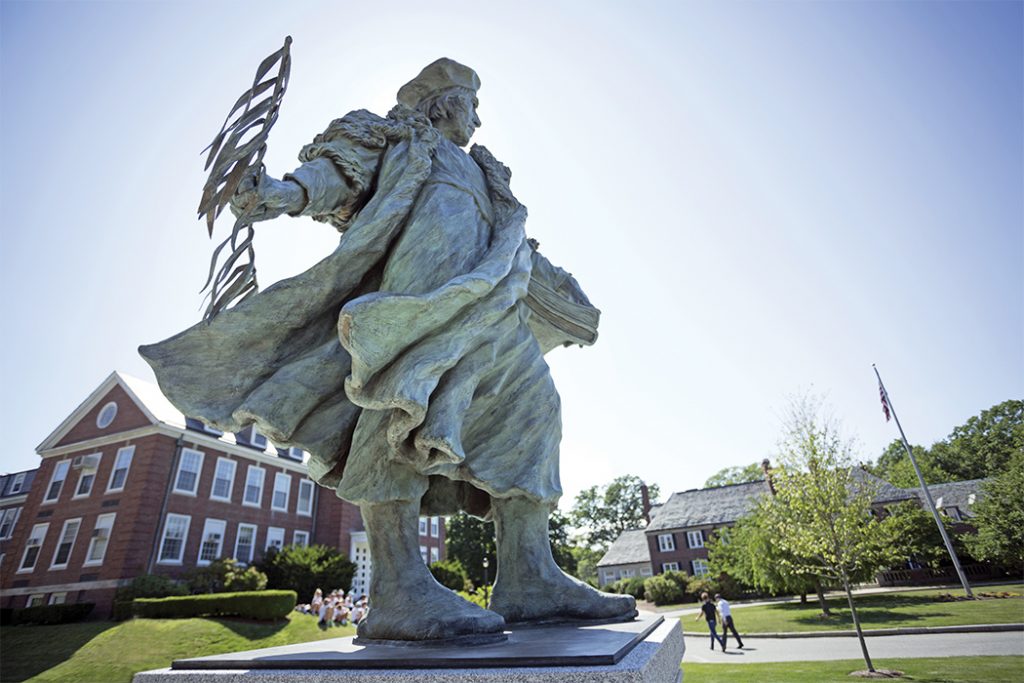Urban League of Eastern Massachusetts (ULEM) has filed an amicus brief with the US Court of Appeals for the First Circuit in the case, Smith v. City of Boston (No. 20-1691), challenging the city’s use of a racially discriminatory lieutenant promotion exam that has prevented the development of much-needed Black leadership within the ranks of the Boston Police Department (BPD).
Boston College Law School’s Civil Rights Clinic, under the direction of Assistant Clinical Professor Reena Parikh, served as counsel for ULEM and authored the brief.
ULEM argues that having more Black leadership in BPD would likely encourage police officers to raise complaints up their chains of command upon seeing police misconduct and could profoundly impact the institutional culture within the police department. By virtue of their racial identity and policies they may prioritize, Black leaders could play a pivotal role in mitigating line officers’ misperceptions of Black communities as a threat, laying a foundation for a more trusting relationship between the police force and Black communities. In fact, a 2020 study conducted by Stephen Wu of Hamilton College indicates that having Black leadership within police departments reduces the rate of deadly police shootings.
Unfortunately, according to the ULEM, the BPD’s exam failed to test for the critical abilities needed to protect Black communities from police brutality, including interpersonal communication skills, cultural competency, and conflict management skills.
“Reducing police violence against Black communities is a business necessity for BPD and the 2008 lieutenant’s exam failed to assess the very skills necessary to achieve this goal,” says Misbah Husain, a law student intern with the BC Civil Rights Clinic and a coauthor of the brief.
The brief was filed in support of the plaintiffs, Black and Latinx police officers, who successfully argued at the federal District Court that BPD’s 2008 lieutenant promotion exam violated Title VII of the Civil Rights Act, because it had a racially disparate impact on Black and Latinx police officers and was insufficiently job-related to justify its use. The city appealed the District Court’s decision, which, if overturned, could allow BPD to continue the use of racially discriminatory promotion exams for police officers.
In its brief, ULEM contends that Black leadership within the Boston Police Department is essential to stopping police violence against Black communities. “Across the country, we’ve begun to see a long overdue reckoning with systemic inequality, racism, and police violence against Black communities; against this backdrop, the importance of the Smith case cannot be overstated,” says Joseph D. Feaster, Jr., board chairman of the Urban League of Eastern MA.
Data from a 2020 investigation by the Boston Globe indicate that between January 2019 and September 2019, nearly 70 percent of individuals stopped by Boston police officers were Black (three times the percentage of Black residents in the city), and that the overwhelming majority of those stops were seemingly done without legal justification. Over 65 percent of BPD officers are White, with Black officers making up just over 21 percent of the entire force, despite the fact that approximately 70 percent of individuals stopped by Boston police are Black. The leadership within BPD is even less reflective of Black communities—as of 2019, BPD has only ever had one active Black captain in its entire department.
“Through this brief, ULEM continues its longstanding commitment to the civil rights of Black communities by demonstrating why Black leadership in BPD matters,” says brief coauthor Syeda Nizami, a law student intern with the BC Civil Rights Clinic, adding that “Black leadership within the BPD could be the difference between life or death for Black communities in Boston.”
The Civil Rights Clinic is not the only BC Law entity to play a role in Smith v. City of Boston. Professor Mark Brodin, who has litigated cases for and written about the Massachusetts Association of Minority Law Enforcement Officers for decades, coauthored that group’s brief to the US Court of Appeals for the First Circuit.
And Smith is not the first case in which the Civil Rights Clinic and Professor Prikh have been involved during their inaugural year at BC Law.
Law School student volunteers Mingcan Tang, Yuan (Amy) Zhao, and Mingyu (Lydia) Zu, along with co-counsel from Rutgers Law School Immigrant Justice Clinic, Cardozo Law Immigration Justice Clinic, and University of Washington School of Law, won a victory at the New Jersey Supreme Court on March 30 in State v. Molchor (084694).
The BC Civil Rights Clinic co-authored an amicus brief on behalf of a national group of immigration law professors and clinicians arguing that New Jersey state courts should not be permitted to consider immigration status in their pre-trial release determinations of criminal defendants. The court favorably cited the amicus brief and held that the Criminal Justice Reform Act in New Jersey does not authorize judges to detain defendants to thwart their possible removal by ICE.
Last month, another Civil Rights Clinic client, the Boston-based women’s worker center Matahari, held a Zoom press conference with Massachusetts Attorney General Maura Healy announcing the launch of a multi-sector campaign to recover stolen wages. Clinic students Rebecca Langsam and Syeda Nizami are working with Matahari to represent some of its members and bring forward wage theft claims against employers.
Read the ULEM Brief. Read more about the establishment of the BC Civil Rights Clinic.


